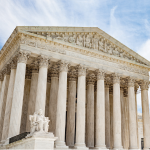In Virginia State Board of Pharmacy v. Virginia Citizens Consumer Council, the U.S. Supreme Court held the First Amendment applied to both commercial and noncommercial speech alike. Writing for the majority, Justice Harry A. Blackmun stated, “that the advertiser’s interest in a commercial advertisement is purely economic does not disqualify him from protection under the First and Fourteenth Amendments. … The ban on advertising prescription drug prices cannot be justified on the basis of the State’s interest in maintaining the professionalism of its licensed pharmacists; the State is free to require whatever professional standards it wishes. … but it may not do so by keeping the public in ignorance of lawful terms that competing pharmacists are offering.”7
This decision affects our daily lives. Under the Virginia statute, Walmart’s and Target’s $4 prescription program would have been verboten. It also would have been nearly impossible to figure out if your neighborhood pharmacy was overcharging you for your medications unless you had time to visit the competition and ask.8
This decision affects our lives in nonmedical ways, as well. The sole dissenting justice in this case was Chief Justice William H. Rehnquist, who, Cassandra like, saw where this was all heading. In his dissent, he wrote, “The logical consequences of the Court’s decision in this case, a decision which elevates commercial intercourse between a seller hawking his wares and a buyer seeking to strike a bargain to the same plane as has been previously reserved for the free marketplace of ideas, are far-reaching indeed. Under the court’s opinion, the way will be open not only for dissemination of price information, but for active promotion of prescription drugs, liquor, cigarettes and other products the use of which it has previously been thought desirable to discourage. Now, however, such promotion is protected by the First Amendment so long as it is not misleading or does not promote an illegal product or enterprise. … This effort to reach a result which the Court obviously considers desirable is a troublesome one, for two reasons. It extends standing to raise First Amendment claims beyond the previous decisions of this Court. It also extends the protection of that Amendment to purely commercial endeavors which its most vigorous champions on this Court had thought to be beyond its pale.”7
As Chief Justice Rehnquist alone had predicted, the Supreme Court’s decision had a much broader impact on jurisprudence than originally intended. Gradually, over the ensuing years, corporations have cemented their claim on First Amendment rights. This has led to the outsize impact of corporations on American politics that have resisted all attempts at being reined in, because money is—at least for now—just another form of speech.9
